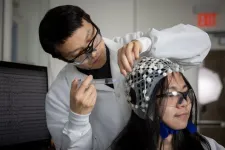(Press-News.org) URBANA, Ill. — For those whose primary experience with corn is the butter-drenched cob variety, it might come as a surprise that other forms of sweet corn are in trouble. A new University of Illinois Urbana-Champaign analysis shows sweet corn production for frozen and canned products has been steadily shrinking in the U.S. over the past 27 years, particularly in rainfed portions of the Midwest.
“The processing sweet corn industry [corn grown for canned and frozen products] was thriving in the U.S. throughout the 20th century. This type of production, as opposed to fresh-market corn on the cob, makes up the majority of sweet corn acres in the U.S. To see such success in a crop and then signs of struggle in recent decades is a disturbing trend,” said senior study author Marty Williams, USDA-Agricultural Research Service (ARS) ecologist and affiliate professor in the Department of Crop Sciences, part of the College of Agricultural, Consumer and Environmental Sciences (ACES) at U. of I.
Williams and co-author Daljeet Dhaliwal obtained proprietary data from major vegetable processing companies who kept records for 20,000 processing sweet corn fields between 1992 and 2018. They split the data into five distinct production areas, reflecting the major water management practices in each: Illinois irrigated, Illinois rainfed, Minnesota rainfed, Washington irrigated, and Wisconsin irrigated. From there, they analyzed trends in planting acres, green ear mass (yield), hybrid lifespan, and more.
“We saw a decline in acreage throughout production areas in the Midwest and Pacific Northwest, the regions where most processing sweet corn production is happening. The one area that bucked the trend and showed an increase in green ear mass was in irrigated fields of Wisconsin. The steepest declines were in rainfed locations here in the Midwest, particularly Illinois,” said Williams, who is with the ARS Global Change and Photosynthesis Research unit, located on the university’s Urbana campus.
Compared with irrigation, rainfed production is inherently more variable and, according to the data, increasingly risky for sweet corn production in parts of the Midwest. Williams said wide swings in precipitation, particularly drought at key growth stages, almost always show up in yield. That’s what seems to be happening in Illinois rainfed systems, where the data showed a precipitous drop in green ear mass in recent years.
Although the analysis was designed to illustrate long-term trends, not causes, Williams and Dhaliwal recently found a strong relationship between extreme temperatures and sweet corn yield loss, implicating climate change. Another cause for the shrinking sweet corn production area is consumer preference, as more Americans are choosing fresh produce over canned products.
The team found few changes in planting date and density over the 27-year period — not entirely surprising given industry standards. But when the team tracked individual hybrids grown across 20,000 fields, a couple of unusual patterns stood out.
“The majority of hybrids, 60%, were grown only a single year. There was clearly some industry interest in looking for new germplasm, new products, to grow, but most hybrids didn’t make the cut long-term. However, there was one hybrid grown for 27 years. It was the single biggest, most important hybrid out there, accounting for about a quarter of the acres,” Williams said. “That is so vastly different than field corn production, where a hybrid's lifespan is just a few years.”
The pattern supports earlier research from Williams’ team showing a preference among sweet corn processors for “workhorse” hybrids — those that perform reliably and consistently across a wide range of conditions. Williams noted processing sweet corn has to tick more boxes than field corn or even fresh market corn on the cob in terms of maintaining its structure and flavor during cob removal, canning, or freezing.
“Vegetable processors in the U.S. have to make decisions on what to grow on tens of thousands of acres. Having some knowledge of past performance helps in planning what to grow, where, and when,” he said. “But the pattern also suggests change comes slowly in sweet corn production. The adage ‘past performance does not guarantee future results’ is a warning, especially if environmental conditions are changing.”
The dataset can’t predict where the industry will go next, but Williams sees a potential for regional shifts in production areas, such as moving into locations with more irrigation infrastructure. He also thinks developing more climate-resilient, stress-tolerant hybrids will be an important investment for seed companies, regardless of where they plant.
The study, “An outlook on sweet corn production from the last three decades (1990s-2010s),” is published in HortScience [DOI: 10.21273/HORTSCI17109-23].
END
Canned, frozen corn industry struggling across US growing regions
2023-07-10
ELSE PRESS RELEASES FROM THIS DATE:
Ethics & Human Research, July-August 2023
2023-07-10
Antiracist Structural Intervention at the Emory University Institutional Review Board
Francois Rollin, Vanessa Van Doren, Jessica Alvarez, Rebecca Rousselle, Jada Bussey-Jones
Although racial and ethnic categories are social constructs without inherent biologic or genetic meaning, race and ethnicity impact health outcomes through racism. The use of racial categories in biomedical research often misattributes the cause of health inequities to genetic and inherent biological differences rather than to racism. Improving research ...
Unhealthy beverage consumption highest among economically-vulnerable households that rely on multiple food assistance programs
2023-07-10
Philadelphia, July 10, 2023 – A long-standing and contentiously debated question is the extent to which US federal food assistance programs contribute to or deter healthy beverage intake. Findings of a new study in the Journal of Nutrition Education and Behavior, published by Elsevier, show that while beverage intake patterns rarely differed between mothers and young children who participated only in the Supplementation Nutrition Program for Women, Infants, and Children (WIC), only the Supplemental ...
Tumor monocyte content predicts immunochemotherapy outcomes for esophageal cancer
2023-07-10
JULY 10, 2023, NEW YORK – A Ludwig Cancer Research study has discovered that the presence of relatively high numbers of immune cells known as monocytes in tumors is linked to better outcomes in esophageal cancer patients treated with a combination of chemotherapy and immunotherapy, or immunochemotherapy. Esophageal cancer is the sixth leading cause of cancer mortality worldwide, and the incidence of esophageal adenocarcinoma has been climbing at a relatively swift clip over the past 40 years. Survival times for inoperable or metastatic forms of the cancer range from 6 to 12 months.
Led by Ludwig Oxford Director Xin Lu and ...
Game-playing automaton acts like an ‘irrational’ human
2023-07-10
ITHACA, N.Y. -- Humans make lots of irrational decisions in predictable ways, but what if we’re all just doing our best within the limits of our abilities?
Researchers were able to simulate human behaviors using a probabilistic finite automaton, a well-known model of limited computational power. They programmed the automatons to compete against each other in a wildlife poaching game, as either a rhino poacher or a ranger trying to stop the poaching.
When the automatons could remember everything, they settled into an optimal game strategy. But when researchers limited their memories, they took some decision-making shortcuts – the same ...
Nearly two thirds of youth would stop vaping without added sweet flavors, menthol, synthetic cooling agents
2023-07-10
COLUMBUS, Ohio – Major progress could be made in fighting the youth vaping epidemic with a complete restriction on sweet flavorings and cooling agents in both cartridge and disposable e-cigarette devices, according to a new study from the Center for Tobacco Research at The Ohio State University Comprehensive Cancer Center. The current U.S. Food and Drug Administration (FDA) flavor ban only applies to cartridge electronic cigarette devices.
A new study published in the Journal of Studies on Addiction and Drugs by researchers ...
Girls Deliver: building an integrated, feminist ecosystem to support adolescent girls at the Women Deliver 2023 Conference
2023-07-10
July 10, 2023 — The Population Council’s GIRL Center, and co-hosts AFIDEP, AMPLIFY Girls, Baobab Research Programme Consortium, Children’s Investment Fund Foundation, Coalition for Adolescent Girls, Exemplars in Global Health, FP2030, Girl Effect, Girls First Fund, Conrad N. Hilton Foundation, the National Democratic Institute (NDI), Plan International, PMNCH, Purposeful, Together for Girls, UNICEF, Women Deliver, and The World Bank Africa Gender Innovation Lab, are proud to host the “Girls Deliver: Pre-Conference on Adolescent Girls,” on July 16. This one-day global convening ...
Light-activated molecular machines get cells ‘talking’
2023-07-10
HOUSTON – (July 10, 2023) – One of the main ways cells “talk” to each other to coordinate essential biological activities such as muscle contraction, hormone release, neuronal firing, digestion and immune activation is through calcium signaling.
Rice University scientists have used light-activated molecular machines to trigger intercellular calcium wave signals, revealing a powerful new strategy for controlling cellular activity, according to a new study published in Nature Nanotechnology. This technology could lead to improved treatments ...
Biomarkers may hold key to precision mental health diagnosis, care
2023-07-10
The study of biomarkers in the brain—powered by cutting-edge machine learning techniques—could redefine the way mental health conditions are categorized and diagnosed and lead to more effective, personalized treatments.
That’s the goal of Yu Zhang, an assistant professor of bioengineering and electrical and computer engineering in Lehigh University’s P.C. Rossin College of Engineering and Applied Science who recently landed major support from the National ...
Navigating the future of underwater geolocalization: how polarization patterns enable new technology
2023-07-10
University of Illinois Urbana-Champaign researchers have developed a novel method for underwater geolocalization using deep neural networks that have been trained on 10 million polarization-sensitive images collected from locations around the world. This new study, led by electrical and computer engineering professor Viktor Gruev, along with computer science professor David Forsyth, enables underwater geolocalization using only optical data while providing a tool for tethered-free underwater navigation.
These findings were recently published in the journal eLight.
“We are showing for the first time, you can geolocate yourself, or a camera, in a number of different ...
Anastasopoulos receives funding for EAGER: building language technologies by machine reading grammars
2023-07-10
Antonios Anastasopoulos, Assistant Professor Computer Science, received $99,294 from the National Science Foundation for: "EAGER: Building Language Technologies by Machine Reading Grammars." This funding began in June 2023 and will end in late May 2024.
Anastasopoulos said, "This project aims to explore the feasibility of building language technologies while bypassing the need for exorbitant amounts of data, instead turning to already-codified linguistic knowledge. This is of particular importance for bridging the language technology gap for underserved communities: ...



